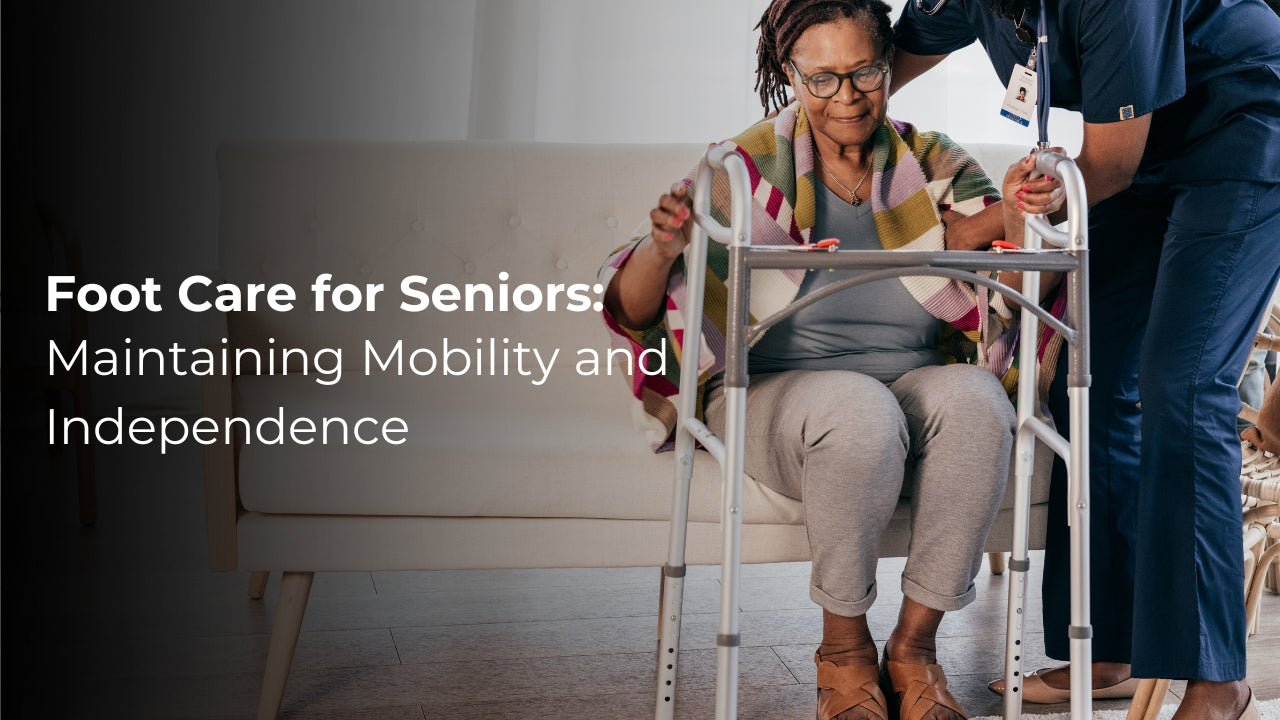As we age, our feet undergo various changes that can impact their health and mobility. Foot problems become more common among seniors, making proper foot care an essential aspect of overall well-being. From decreased circulation to age-related conditions like arthritis, seniors may face unique challenges when it comes to foot health. In this blog, we'll discuss the importance of foot care for seniors and provide practical tips to keep their feet healthy and pain-free.
-
Regular Foot Inspections: Seniors should inspect their feet daily for any signs of injury, irritation, or changes in skin condition. Look for cuts, bruises, blisters, or redness, especially on the bottoms of the feet and between the toes. Early detection of foot problems can prevent them from worsening and reduce the risk of complications.
-
Proper Nail Care: Trim toenails straight across and avoid cutting them too short to prevent ingrown nails. Seniors with mobility or vision issues may benefit from professional nail care services to ensure proper nail trimming and maintenance.
-
Moisturize Daily: Keep feet hydrated by applying moisturizer regularly, particularly to dry areas like the heels and soles. Dry skin can lead to cracks and fissures, increasing the risk of infection. Choose a moisturizer that is fragrance-free and specifically formulated for sensitive skin.
-
Wear Comfortable, Supportive Shoes: Proper footwear is crucial for seniors to maintain stability and prevent falls. Choose shoes with ample cushioning, arch support, and a wide toe box to accommodate any foot deformities or conditions. Avoid high heels, flip-flops, and shoes with narrow or pointed toes, as they can cause discomfort and increase the risk of foot problems.
-
Orthotic Inserts and Insoles: Seniors with foot deformities, arthritis, or other chronic conditions may benefit from orthotic inserts or custom-made insoles. These devices can provide additional support, cushioning, and alignment to alleviate pain and improve mobility.
-
Manage Foot Pain and Discomfort: Seniors experiencing foot pain or discomfort should seek medical attention promptly. Persistent pain, swelling, numbness, or tingling may indicate underlying health issues that require evaluation and treatment by a healthcare professional.
-
Maintain Proper Foot Hygiene: Practice good foot hygiene by washing feet daily with mild soap and lukewarm water. Dry feet thoroughly, especially between the toes, to prevent fungal infections like athlete's foot. Seniors should avoid soaking their feet for extended periods, as it can lead to maceration and breakdown of the skin.
-
Monitor Blood Circulation: Poor circulation is common among seniors and can contribute to foot problems such as cold feet, numbness, and slow wound healing. Keep an eye out for signs of poor circulation, such as pale or blueish skin, and consult a healthcare professional if concerns arise.
-
Stay Active and Maintain Healthy Weight: Regular physical activity promotes circulation, flexibility, and overall foot health. Seniors should engage in low-impact exercises like walking, swimming, or tai chi to keep their feet and joints mobile. Maintaining a healthy weight reduces the strain on the feet and lowers the risk of developing foot problems.
-
Regular Foot Exams: Schedule regular foot exams with a podiatrist or foot specialist to monitor foot health and address any concerns. Seniors with diabetes or other chronic conditions that affect foot health should undergo comprehensive foot examinations at least once a year.
In conclusion, proper foot care is essential for seniors to maintain mobility, independence, and overall quality of life. By following these tips and incorporating regular foot care into their daily routine, seniors can prevent foot problems and enjoy healthy, pain-free feet as they age. Remember, taking care of your feet is an investment in your overall well-being, so prioritize foot health and seek professional help when needed.

